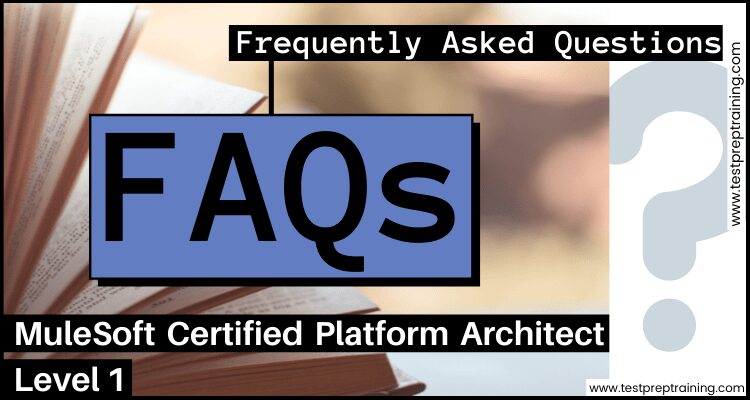MuleSoft Certified Platform Architect – Level 1
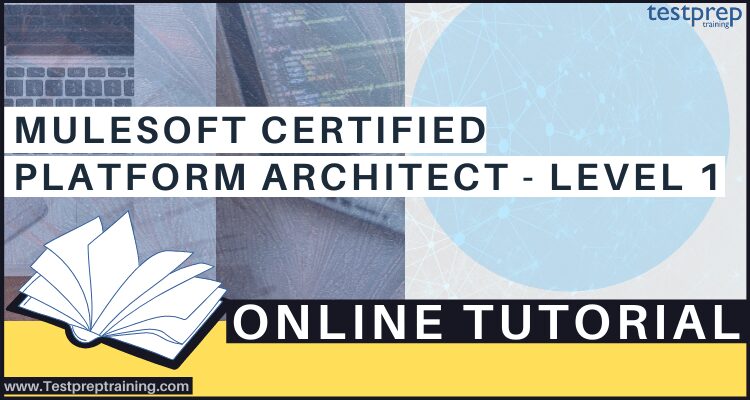
A MuleSoft Certified Platform Architect must have the ability in defining and should be responsible for an organization’s Anypoint Platform strategy. However, the MCPA – Level 1 exam examines an architect’s knowledge and skills for directing the emergence of an effective application network out of individual integration solutions following API-led connectivity over an organization using the Anypoint Platform.
Further, candidates successfully earning the certification will build knowledge in:
- Firstly, optimizing and shaping the Anypoint Platform deployment in the defined organizational context, working with business, infrastructure, InfoSec, and other teams.
- Secondly, specifying how Anypoint Platform is used in conjunction with other tools and applications in the organization.
- Thirdly, defining the usage of the Anypoint Platform and the corresponding organizational and process changes required for helping the platform be sustainable.
- Lastly, providing guidance and driving the creation of standards, reusable assets, and automation needed for scale and multi-LoB adoption.
Exam Format
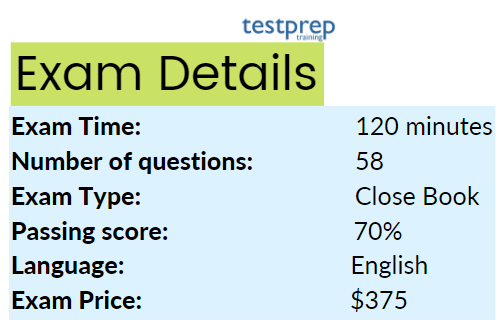
- MuleSoft Certified Platform Architect – Level 1 exam is a closed book exam that will have 58 multiple-choice questions.
- For completing the exam, there is a time duration of 120 minutes.
- To pass the exam, there is a minimum passing score of 70%.
- The exam will cost you around $375 (USD). And, the exam can be given in the English language.
- However, the exam has a validity of 2 years and in order to extend the validity, you can take the MuleSoft Certified Platform Architect– Level 1 MAINTENANCE exam.
- Further, you can take the exam a maximum of 5 times, with a 24-hour wait between each attempt.
Schedule the Exam
- For scheduling the MuleSoft Certified Platform Architect – Level 1 exam, you have to log in to your learner account.
- Then, purchase the certification exam, prepare for the exam, and take the certification exam.
- And, MuleSoft no longer supports taking certification exams at physical test centers.
Exam Course Outline
MuleSoft Certified Platform Architect – Level 1 exam validates candidate’s performance on the basis of the following topics:
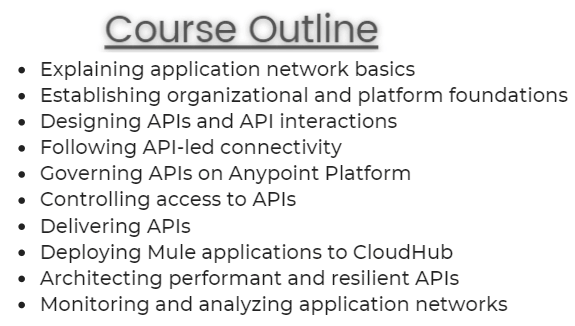
1. Explaining application network basics
- Explain MuleSoft’s proposal for closing the IT delivery gap.
- Describe the role and characteristics of the “modern API.” (Reference: API Strategy Resources)
- Define and describe the benefits of API-led connectivity and application networks. (Reference: What is API-led Connectivity?)
- Define outcome-based delivery (OBD).
- Correctly use the terms API, API implementation, API client, API consumer, and API invocation. (Reference: API (Application Programming Interface)
- Describe the capabilities and high-level components of the Anypoint Platform. (Reference: Core Components)
2. Establishing organizational and platform foundations
- Describe the purpose and roles of a Center for Enablement (C4E). (Reference: What is a Center for Enablement (C4E))
- Identify KPIs to measure the success of a C4E.
- Given specific organizational requirements, preferences, and constraints, identify all suitable Anypoint Platform deployment options.
- Select Anypoint Platform identity management vs client management for the correct purpose. (Reference: Identity Management, Client Management)
3. Designing APIs and API interactions
- Break down functional requirements into business-aligned APIs with effective granularity.
- Given a set of APIs and specific preferences and organizational characteristics, recommend the use of an Enterprise Data Model or Bounded Context Data Models.
- Identify changes to an API that would require or not require a major version increment. (Reference: Change the Version of an API Asset, API Versions and Instances)
- When asynchronous execution of API invocations is needed, select when to appropriately use polling or callbacks. (Reference: Poll Reference)
- Identify idempotent HTTP methods and HTTP-native support for optimistic concurrency. (Reference: Idempotent Message Validator, Idempotent Filter)
- Describe the creation and publication of reusable API-related assets using RAML and Anypoint Platform components. (Reference: RAML API Fragment in the Text Editor in API Designer, API Designer)
4. Following API-led connectivity
- Identify appropriate APIs to implement a business process and assign them to layers of API-led connectivity. (Reference: What is API-led Connectivity?)
- Assign APIs to layers according to ownership, functional focus, and rate of change.
- Given specific requirements and organizational characteristics, recommend the most appropriate approach relating the API data model of System APIs to that of their backend system.
5. Governing APIs on Anypoint Platform
- Given specific preferences and constraints, select API policy enforcement with or without API proxies. (Reference: Policies Overview, Apply a Policy)
- Select appropriate API policies to enforce non-functional constraints on API invocations.
- Given an API policy with specific characteristics, identify any change required in the corresponding RAML definition. (Reference: Traits & policies concepts of RAML/OAS based APIs)
- Given a layer of API-led connectivity, identify API policies that are typically applied to that layer and the scenarios needing custom policies.
- Identify which types of APIs and other remote interfaces are or are not amenable to management by API Manager. (Reference: Types of APIs and how to determine which to build)
6. Controlling access to APIs
- Describe when and how to pass client ID and secret to an API. (Reference: Client ID Enforcement Policy, Obtaining the Client Credentials)
- Explain how to register an API client for access to an API version. (Reference: Request Access, To Request Access to an API)
7. Delivering APIs
- Describe the automation capabilities of Anypoint Platform for DevOps, CI/CD, and testing. (Reference: Continuous Integration, DevOps Tools to Build, Test, and Deploy with Ease)
- Compare unit and integration tests and specify where MUnit is best employed. (Reference: Testing Strategies, Introduction to Testing Mule)
- Explain how to use autodiscovery to link an API implementation to an API instance managed with API Manager. (Reference: Autodiscovery, To Configure Autodiscovery)
- Specify how and when to promote APIs with API Manager. (Reference: API Manager 2.x, Configuring an API Endpoint in API Manager, Promoting an API Instance to Another Environment)
- Identify when redeployment of API implementations is necessary. (Reference: Deployment Options, Redeploy a Deployment, Deploying, Redeploying, or Undeploying an Application To or From a Cluster)
8. Deploying Mule applications to CloudHub
- Describe the fundamentals of deployments, networking, and routing on CloudHub. (Reference: CloudHub Networking Guide, Develop Applications for CloudHub, Deploy to CloudHub, CloudHub Architecture)
- Select CloudHub worker sizes and configuration as appropriate.
- Describe the scenarios for which Object Store should be used with CloudHub. (Reference: Object Store v2)
9. Architecting performant and resilient APIs
- Identify the factors involved in scaling API performance. (Reference: Tuning Performance, Autoscaling in CloudHub, Resource Allocation and Performance)
- Identifying the differences between the CloudHub Shared and Dedicated Load Balancers. (Reference: CloudHub Load Balancers, Dedicated Load Balancers)
- Identify single points of failure in typical CloudHub usage. (Reference: High Availability and Disaster Recovery)
- Select strategies that help API clients guard against failures in API invocations.
10. Monitoring and analyzing application networks
- Identify the components of the Anypoint Platform that generate data for monitoring and alerting. (Reference: Anypoint Monitoring Overview, Alerts)
- Describe the metrics collected by Anypoint Platform for API invocations. (Reference: Reviewing Analytics Usage)
- Describe and select between the options for performing API analytics within and outside of Anypoint Platform.
- Specify alerts to define key metrics of API invocations for all layers of API-led connectivity. (Reference: Reviewing Alerts Concepts)
- Specify alerts to define API implementations. (Reference: Add API Alerts, Alerts)
Check MuleSoft Certified Platform Architect – Level 1 Exam FAQS
Exam Terms and Conditions
MuleSoft’s Certification Exam provides various terms and conditions that are applied for all certifications. Some of them are:
1. Eligibility
For taking MuleSoft Certification exams, candidates must be 18 years of age or older. There should be only one exam account. However, if there are multiple exam accounts then, a violation of this agreement will be there.
2. Reschedule or canceling the exam
- Firstly, log in to your account at training.mulesoft.com. Then, click on Dashboard from the top menu.
- Secondly, click on Certification Exams under Enrollments. Then, locate the exam you want to reschedule.
- Thirdly for rescheduling the exam, click the BLUE calendar icon. This is available next to the name of the exam. After that, choose a new date and time.
- However, if you need to cancel your scheduled exam, then, locate the exam you want to cancel and click the RED calendar icon with an “x” inside of it.
MuleSoft Certified Platform Architect – Level 1 Exam Study Guide
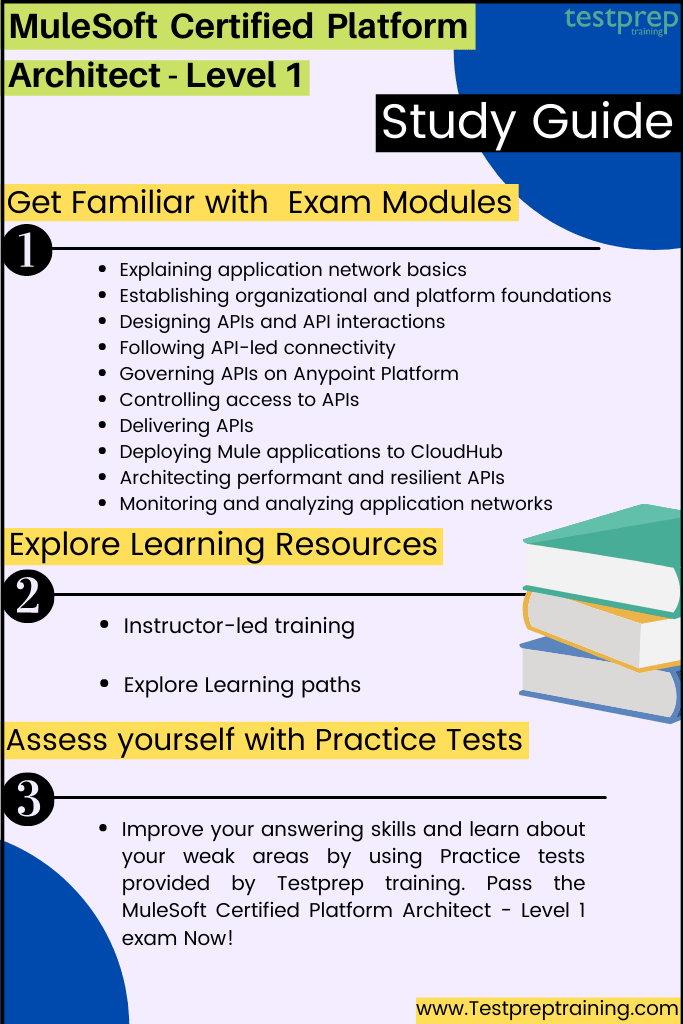
1. Get Familiar with the Exam Topics
The MuleSoft Certified Platform Architect – Level 1 exam measures your knowledge and skills on the basis of various sections and concepts. These areas will help you in understanding the core of the exam as well as you will be able to apply your knowledge and skill in each of the areas. However, the topics for the exam are:
- Explaining application network basics
- Establishing organizational and platform foundations
- Designing APIs and API interactions
- Following API-led connectivity
- Governing APIs on Anypoint Platform
- Controlling access to APIs
- Delivering APIs
- Deploying Mule applications to CloudHub
- Architecting performant and resilient APIs
- Monitoring and analyzing application networks
2. Instructor-led training
The instructor-led training course is recommended as the most effective method of preparation. This is a 3-day class course that offers private, public, onsite, and online classes. However, the course covered here is:
Anypoint Platform Architecture: Application Networks
An application network is responsible for connecting applications, data, and devices within an enterprise and to external ecosystems using APIs. However, this course teaches experienced enterprise and solution architects the process for directing the emergence of an effective application network out of individual integration solutions following API-led connectivity over an organization. Further, after successful completion of the course, candidates will have knowledge and skills in:
- Firstly, breaking down functional requirements into business-aligned, versioned APIs with effective granularity and API data model.
- Secondly, directing creation and publication of API-related assets using RAML and Anypoint Platform components.
- Thirdly, architecting for non-functional requirements on the level of API invocations and API implementations using elements of Anypoint Platform.
- Thirdly, selecting Anypoint Platform deployment options and advising on effective use of the automation capabilities of Anypoint Platform for DevOps, CI/CD, and testing.
- Lastly, advising on the establishment and operation of a Center for Enablement (C4E).
3. MuleSoft Learning Paths
MuleSoft offers various learning paths from which you can start preparing according to the role you have applied for using the step-by-step pathway. However, this is for both beginners and experienced user who wants to succeed in their role. Moreover, this also provides you an exam pattern in which you can select the exam according to your skills and experience.
4. Start taking Practice Tests
Taking the tests will improve your answering skills and help you get a strong revision by evaluating after every topic. Moreover, using the practice tests will help you to find out your weak areas. So, start practicing using the MuleSoft Certified Platform Architect – Level 1 Exam practice exam tests and pass the exam.
Prepare for MuleSoft Certified Platform Architect – Level 1 Exam Now!

